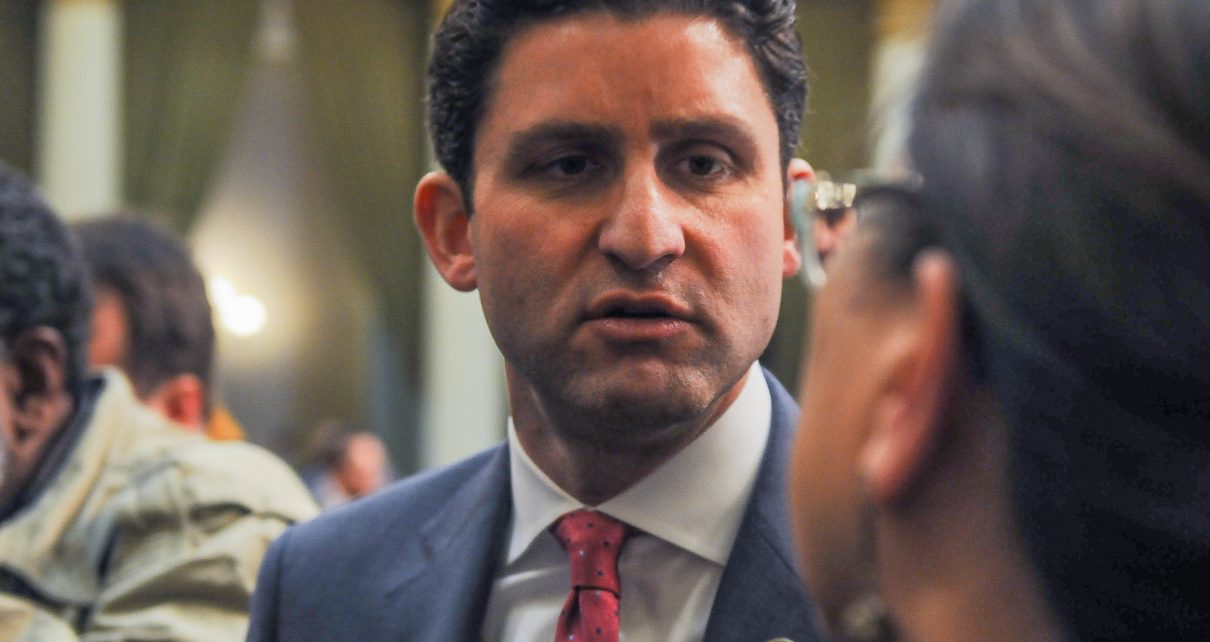
Assemblyman Jesse Gabriel. (Photo: Kevin Sanders for California Globe)
Bill To Have Prosecutors and Courts Determine Incarceration Costs Passes Assembly
Some Democrats join Republicans in opposition to AB 1474
By Evan Symon, June 3, 2021 3:20 pm
A bill to require prosecutors and judges to determine how much it would cost taxpayers to incarcerate defendants at sentencing was passed by the Assembly on Wednesday.
Assembly Bill 1474, authored by Assemblyman Jesse Gabriel (D-Woodland Hills), would require multiple entities in the court to announce what the economic effects of incarceration, or other methods of serving time like house arrest and probation, would be.
Under AB 1474, Prosecuting attorneys would be required to, at sentencing, state on the record the estimated cost of incarceration or supervision for any proposed sentence. The court would also have to state the estimated cost of the sentence at sentencing. If there is a pre-sentence report, a county probation office would need to to provide the court with specified information regarding the estimated and projected cost of incarceration or other supervision of the defendant as has been proposed in the recommended sentence.
The Legislative Analyst’s Office (LAO) would also be required to annually put together what the average costs of incarceration and post-incarceration supervision would be for an inmate under the supervision of the California Department of Corrections and Rehabilitation (CDCR). That information would also need to be given to prosecutor’s offices and the chief probation officer of each county. Similarly, the Board of State and Community Corrections would need to compile the yearly costs of incarceration and noncustodial supervision for a person under the supervision of each county sheriff or probation department, and to provide the information to prosecutor’s officers and the chief probation officer of each county.
All announced incarceration estimates would be based off of figures from both these state entities.
Assemblyman Gabriel wrote the bill in an effort to reduce incarceration by being transparent with how much each prisoner would cost the state. Gabriel specifically pointed out in a press release on Thursday that, despite California incarcerations going down by around 25% and the paroled population going down by half, CDCR spending has increased during the same time period from about $9.7 billion in 2010‑11 to an estimated $13.3 billion in 2019‑20. In total, California now spends more on prisoners than Texas and New York combined. Gabriel also noted that prosecutor’s don’t always consider costs when pushing for state incarceration.
“Despite recent reforms in our approach to criminal and juvenile justice, California continues to lead the nation in spending on corrections,” noted Assemblyman Gabriel on Thursday. “This results in diminished revenues for other public policy priorities, including education, housing, human services, public health, and environmental protection. AB 1474 builds on momentum to promote fiscal accountability and end California’s failed experiment with mass incarceration. The measure will bring additional transparency to the sentencing process and help prosecutors and judges to consider the broader impacts of the sentences they recommend and impose. In so doing, AB 1474 will help to ensure that taxpayer resources are spent wisely and in a manner that truly advances justice and public safety.”
Strong opposition against AB 1474
However, AB 1474 has had strong opposition against it since being first introduced earlier this year. Detractors have pointed out that saying the cost of what the incarceration would actually hinder fair sentencing, due to more focus being put on cost rather than on the crime. Some have noted that other measures could be taken to reduce higher costs, such as an audit of the CDCR system to find out what areas can be cut back on or aligning costs closer to other high inmate population states such as Texas.
“There are lots of ways to reign in higher costs,” noted Jack Walker, a former prison guard in several state systems, to the Globe on Thursday. “Consolidating prisons has to be the biggest, but that is often controversial too because they are such big employers in rural areas. California has been closing some in the last few years, so we’ll see what that does to those higher costs. But other states have been more creative, from getting cheaper food suppliers to testing how to work in fewer guards during shifts to reducing non-emergency medical services.
“Saying how much it will cost to put someone in jail really won’t matter in the end because you’re saying that right after you announced what their crime was, and to many, the crime matters more than the price, especially to victims.”
Support for the bill has also been slowly decreasing, with many Democrats, such as Assemblywoman Tasha Boerner Horvath (D-Encinitas), joining Republicans in the most recent vote against the bill. While it passed 53-20 in the Assembly on Wednesday, the number of no votes exceeding the number of Republicans in the Assembly showed that AB 1474 may face a more challenging Senate approval.
AB 1474 is expected to be heard in Senate committees later this month.





Good. The less California spends on Prisons, the more it can spend on the UC System and restore some of the sanity. I’m convinced Pelican Bay is just one big CIA psyop designed to harden people so they can recruit paramilitaries to work for US-funded cartels in Central America.
If you go back to the 70’s and 80’s and the crazy agent provacateur stuff that turned California into a prison complex, all these sentences came out of both intelligence agency drug running into the inner cities and various psyops and fake serial killer incidents – and of course DiFi’s husband had huge investments in things like metal detector supply companies. I urge reading David McGowan’s book about all the inconsistencies with the “serial killers” that we had in the 80’s and their ties to national security. It’s really just organized crime. And it makes my sister crazy – she thinks some rapist is going to jump out at her, and I keep telling her to turn the TV off because it’s all propaganda designed to mess with her head. Then you have the militarized police and the totally unnecessary SWAT teams all of which do nothing to keep anyone safe. In 1972, there were exactly two bomb squads in the country – after all the CIA//FBI boogies such as the SLA, now everybody needed one – and Deukmeijan was willing to play ball – he was the Long Beach police chief. Don’t forget – huge Naval Intelligence presence in Long Beach back then.
People get all upset about heroin and homelessness, but they don’t look at our intelligence agencies or Afghanistan or Gary Webb or Dan Hopsicker and figure it out. Harlem didn’t have a drug problem in the 20’s or 30’s – it was only until the CIA (and this is well documented) built an alliance with the mob that they started dumping heroin in Harlem. All the drugs on the west coast are brought in by our own goverment with the DEA acting as a drug cartel.